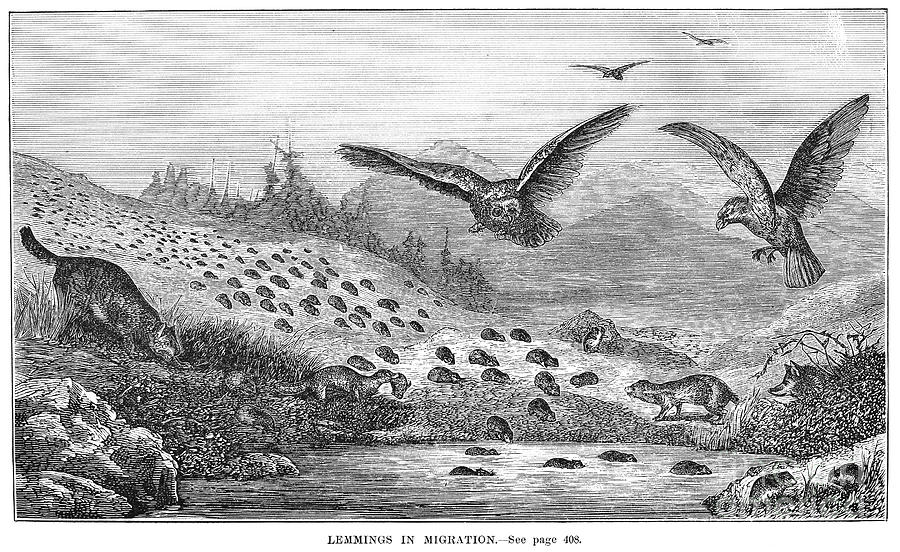I’m traveling today so here is a poem by my father about our feeble attempts to understand what moves history. Three birds and the wind address lemmings as they launch into their migrations. The first bird warns them about their insanity, the second wonders whether they are propelled by hunger or boredom, and the third imagines that a higher destiny dictates their movement.
The wind, however, sees their movement as no less random than its own. Speaking in French, perhaps because hard truths sound more poetic in a foreign language, it says lemmings are merely driven by blind forces. They are rats following an invisible piper to their deaths. The last stanza can be translated as
They don’t know what they are seeking to find
Sighed a wind out of Sault-au-Mouton
These aren’t anything but rats that follow the Piper
These are nothing but blind forces that move
I sense, the the wind’s words an echo of Francois Villon’s sad longing as he grappled with the fact of death. Seeking to understand why beautiful ladies die, the medieval poet famously wrote,
Nay, never ask this week, fair lord,
Where they are gone, nor yet this year,
Save with this much for an overword,
–But where are the snows of yesteryear?
Mais ou sont les neiges d’antan?
I’ve come to understand that my father’s World War II experiences, especially witnessing Dachau and then feeling shattered by the atom bomb, led him to conclude that life is meaningless. He identifies with the wandering lemmings in his poem. Yet rather than succumb to pessimism, he decided to make meaning for himself, working tirelessly for social justice and turning his fatalism into sometimes haunting poetry.
That is about the best response I can imagine to existential despair.
The Wandering Lemming
By Scott Bates
The sea is too wide cried a circling skua
To the river of wandering lemming
The sea is as wide as from here to disaster
And too bloody icy for swimming
What drives you to suicide out on the water
Called politely a kittiwake kiting
Was the land of the tundra too barren of pasture
Or the call of the sea too inviting
The lemming are moving through Destiny’s talons
Said a venerable sea eagle climbing
Their swim is a Symbol of Life’s Aspirations
Of Seeking and Striving and Find
Ils ne savent rien de chercher de trouver
Sighed a wind out of Sault-au-Mouton
Ce ne sont que des rats qui suivent le Pipeur
Ce ne sont que des forces qui vont
Further thoughts: I just realized that the wind is actually Paul Verlaine’s wind from “Autumn Song” and that the lemmings are like his dead leaf, blown hither and yon. I’ve posted here on the poem, which also harkens back to Villon’s deep sense of loss. The wind speaks in French because it speaks with Verlaine’s voice. The poem ends as follows:
And I depart
On an ill wind
That carries me
Here and there,
As if a
Dead leaf.
Previously posted Scott Bates animal fables
What Light Verse Meant to Scott Bates
Pesticides vs. Sweetness and Wings
The Animals Are Trying to Warn Us
Keeping Environmental Hope Alive
In Praise of Light Summer Reading
Christmas Bird Count from Santa’s Sleigh
The True Meaning of the Holy-Days
My Father’s Love Song to Phoebe
In Praise of Irreverent Squirrels
A Hunchback Dreams of Swallows
A Snake that Refused To Be Used
Moments of Perfection in the Sun
America’s Avian Maestro, the Mockingbird
The Day Rabbits Attacked Napoleon
A Poetic Skylark and an Introspective Snake
Rhinos and RINOs, Both Endangered
The Cosmic Meaning of Flushing Flies
Epiphany from a Camel’s Point of View
A Roc for Christmas (Annual Bird Count)
A Whale Poem to Lift the Spirits
Mama Grizzly vs. Real Grizzlies
Dr. Doolittle vs. the Oil Spill


